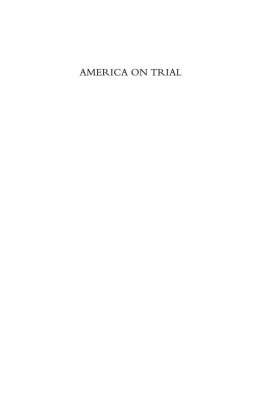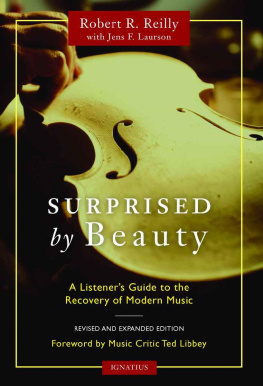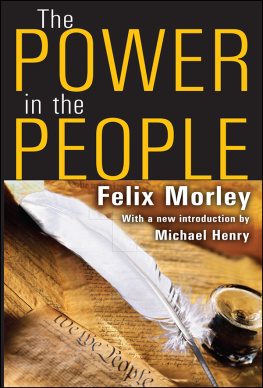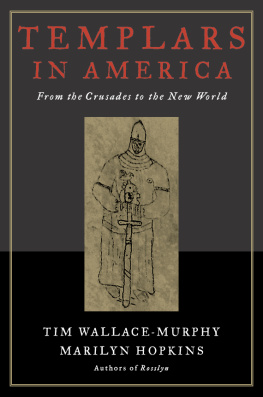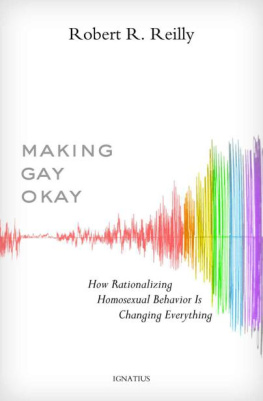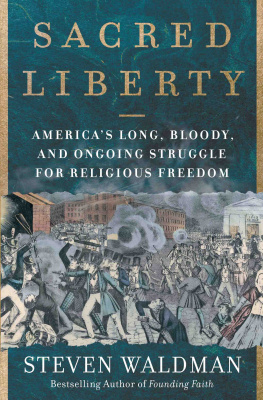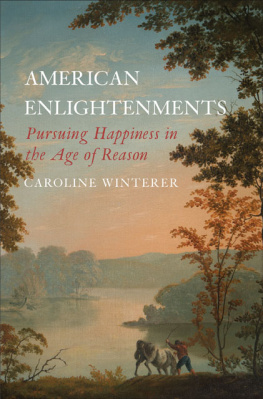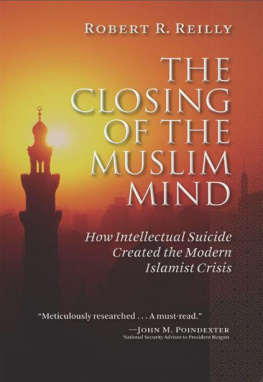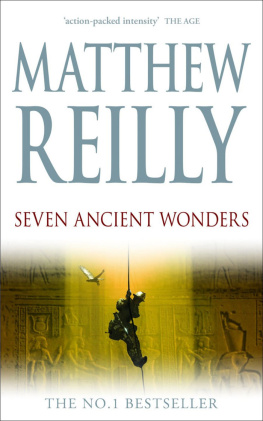AMERICA ON TRIAL
ROBERT R. REILLY
America on Trial
A Defense of the Founding
With a Foreword by
Larry P. Arnn
IGNATIUS PRESS SAN FRANCISCO
Unless other wise indicated, Scripture quotations are from Revised Standard Version of the Bible Second Catholic Edition (Ignatius Edition) copyright 2006 National Council of the Churches of Christ in the United States of America. Used by permission. All rights reserved worldwide.
Excerpts from the English translation of the Catechism of the Catholic Church for use in the United States of America copyright 1994, United States Catholic Conference, Inc. Libreria Editrice Vaticana. English translation of the Catechism of the Catholic Church: Modifications from the Editio Typica copyright 1997, United States Conference of Catholic Bishops Libreria Editrice Vaticana.
Cover art
Signing the Declaration of Independence, July 4th, 1776
by John Trumbull (17561843)
Capitol Collection, Washington, D.C./Bridgeman Images Cover design by John Herreid
2020 by Ignatius Press, San Francisco
All rights reserved
ISBN 978-1-58617-948-9 (HB)
ISBN 978-1-64229-114-8 (eBook)
Library of Congress Control Number 2019947393
Printed in the United States of America
To the memory of my uncle Major Robert R. Egan,U.S. Army Air Forces (d. 1943, Morocco),
whom I never had the privilege of meeting,
and with great love to
Michael, Catherine, Matthew, and Teresa,
who will carry on from here
May this notification, by some faithful record, be handed down to the yet unborn descendants of Americans, that nothing but the most fatal necessity could have wrested the present inestimable enjoyments from their ancestors.
Let them universally inculcate upon their beloved offspring an investigation of those truths, respecting both civil and religious liberty, which have been so clearly and fully stated in this generation. May they be carefully taught in all their schools and may they never rest until, through a Divine blessing upon their efforts, true freedom and liberty shall reign triumphant.
Recommendation of Townships of
Monmouth County, New Jersey, 1774
Cease to accept as a matter of course your blessings, your rare good fortune.
General George C. Marshall, 1951
CONTENTS
Foreword
ix
Preface
xv
Introduction: Do We Hold These Truths?
1 The Legacies of Athens, Jerusalem, and Rome
2 The Medieval Roots of Constitutionalism
3 The Loss of Reason and Nature
4 Enter: Martin Luther Exit: Christendom
5 Richard Hooker: Restoring Natural Law
6 Thomas Hobbes and the Rise of Secular Absolutism 172
7 The Divine Right of Kings and Its Enemies
8 John Locke: Problem or Solution?
9 A Restorative Founding on Reason
10 The Antipodes: The American Revolution versus
the French Revolution
11 Critiquing the Critics: Why They Go Wrong about What Was Right
Epilogue: If the Founding Was Good, Why Did Things
Go Bad?
Selected Bibliography
Index
FOREWORD
This book is about a trial, the trial of America. A trial can mean any kind of ordeal, but the archetype is a defendant set in a dock before a judge, prosecuted for violating some standard of law or right or both.
Robert Reilly, a friend of mine for decades, argues that America faces that kind of trial. He is not quite the prosecutor, for he would rather rescue than convict. The American people are in the dock, but also they are almost like the judge, for they must decide and thereby determine their own fate.
This book is part of a genre, one of the grandest in American political thought and history. This genre depicts America as an experiment or a quest, a journey to reach a goal that is perfect even if life on this earth cannot be. The first paragraph of TheFederalist says that Americans are appointed to decide the important question, whether societies of men are really capable or not of establishing good government from reflection and choice, or whether they are forever destined to depend for their political constitutions on accident and force. Lincoln said that the central principle of America is to be
constantly approximated and thereby constantly spreading and deep-ening its influence, and augmenting the happiness and value of life to all people of all colors everywhere. To approximate is not quite the same thing as to match or to attain.
This effort to approximate is the specific activity of America, the function that gives it life, the calling that gives it direction. Its justification under the Laws of Nature and of Natures God makes the trial cosmic in scope. It is a drama across all time.
Representative of a genre, this book is still unique. It is not really about the trial itself, nor is it even a statement of the indictment.
We can face the trial and answer the indictment only after we understand the law under which we are accused. The purpose of this book is to explain that law, show its preciousness, and begin to contrast it with our contemporary ways. It prepares us to formulate the case to save ourselves.
ix
x
It will not be easy, because so much is lost. To recover what is lost, Reilly digs down very deep into the past, down before America, down before Christ, down before philosophy, down to the revelation of the Hebrew God. To understand the law that informs America yet transcends time, we must begin with that God. He is eternal. He is wholly good and therefore holy. He is Almighty, yet he created us free. He is the ultimate source of the transcendent law available to human reason, the Laws of Nature and of Natures God. Under these laws, America was formed. The charge being made against America, however, is the reverse that she abandoned these laws.
The application of these laws to America cannot be understood, Reilly argues, without understanding Christ, who although one with God, amended the Hebrew understanding of God in two ways.
First, he is fully and completely the God not only of the Jews but of everyone. Second, he does not give laws in the ordinary sense. He says: My kingdom is not of this world. He does not form a polity, a political entity giving and enforcing laws. The regular laws must come from our instructed conscience and our judgment, if we can muster them.
Nonetheless the ordinary law will still control the monopoly on power that makes it law. The law will therefore be especially dangerous to this new kind of religion that crosses national boundaries and has no army of its own. All governments are jealous of competing authorities, and tyrants in particular hate anything that invites us to look over their heads. There is plenty of talk among American elites these days to the effect that the government is our church and our political leaders the priests. Against this the dispensation of Christ favors freedom, especially freedom of religion. The followers of Christ have a right to those beliefs. The business of government is to protect that right.
But can it any longer? Or rather, will it? Some argue that a terrible rupture took place between the political philosophy that arose from the triad of Jerusalem, Athens, and Rome and that of the Enlightenment. They say that America is hopelessly founded upon the latter and that her current existential crisis is the logical result of that flawed beginning. The story that Reilly tells, however, disrupts the neatness of many accounts of the history of political philosophy. In his view, the break is not simply between the ancients and the moderns: there
foreword
xi
are differences within antiquity and within modernity, and there are similarities that cross the boundary between them. It is not just an eternal quarrel between reason and revelation: the understanding of the relationship between them alters; sometimes it is sound and sometimes it goes astray.
Next page
